Deep-Ocean Science, Technology and Conservation
21st Century Opportunities and Imperatives
Held on 13th November 2013
| Welcome | |
| Professor Quintin McKellar, CBE | Vice-Chancellor, University of Hertfordshire |
| Chair | |
| Dr Philomène Verlaan | Senior Technical Adviser, IMarEST |
| Speakers | |
| Dr Paul Tyler | Professorial Research Fellow, Ocean and Earth Science / Personal Chair, University of Southampton |
| Dr Cindy Lee Van Dover | Harvey W. Smith Professor of Biological Oceanography and Chair, Division of Marine Science and Conservation, Nicholas School of the Environment, Duke University and Director of the Marine Laboratory |
| Dr Samantha Smith | Vice-President Corporate Social Responsibility, Nautilus Minerals; President-Elect International Marine Minerals Society |
| Vote of Thanks | |
| Andreas I. Chrysostomou | President of the IMarEST. Head, Division for Maritime Policy, Multilateral Affairs and Standards, Department of Merchant Shipping, Government of Cyprus. |
| Synopsis |
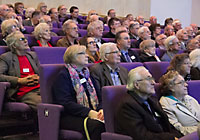
Audience in the Weston Auditorium
The 2013 EEESTA Seminar “Deep-Ocean Science, Technology and Conservation” – EEESTA’s fifteenth annual prestige seminar – took place on the evening of Wednesday 13th November 2013, at the University of Hertfordshire. Although there was a last minute change of Chairman the Seminar was a great success. Despite some no-shows there were over 300 delegates, including many students from schools and two Universities in the region.
The University of Hertfordshire provided a splendid finger buffet in the Atrium for all the delegates to enjoy. The newly refurbished Atrium adjacent to the Weston Auditorium made networking with other delegates very enjoyable.
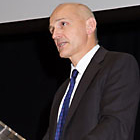
Quintin McKellar
The Seminar was opened by Professor Quintin McKellar CBE, Vice Chancellor, University of Hertfordshire who gave a short welcome address which included a brief description of some of the related research being carried out in University of Hertfordshire.
Professor McKellar then handed over to the Chairman, Dr Philomène Verlaan: Senior Technical Adviser, IMarEST. Dr Verlaan had taken over as Chairman at very short notice as Professor David S. Cronan, Professor Emeritus, Marine Geochemistry, Department of Earth Sciences and Engineering, Imperial College London, was suffering from pneumonia.
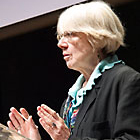
Philomène Verlaan
Before the main business of the evening the Chairman had two pleasant tasks to fulfill for EEESTA: she presented the EEESTA Innovation Award, and acknowledge two Friends of EEESTA.
The EEESTA Innovation Award was inaugurated in 2008 to celebrate the 10th annual Prestige Seminar at the University of Hertfordshire. This year it went to Maxwell Munford of The Knights Templar School, Baldock, an outstanding Arkwright Scholar from the region.
The Arkwright Trust is a charity which aims to promote engineering to young people and now has several hundred scholars each year across the whole country.
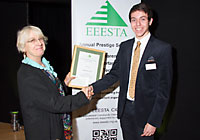
Maxwell Munford receives his EEESTA Innovation Award
Maxwell seems to be a versatile and resourceful young man. He has visited CERN to see the Large Hadron Collider. He has been researching, resourcing and collecting tonewood from Austria for his double bass product design project. He has designed plans for equipment to fit out a local shop in his local town, and he has acted as an ambassador for the Arkwright scheme in his school. Maxwell is planning taking work experience in Astrium early next year, and intends to study Engineering at one of the foremost UK Engineering Universities.
EEESTA owes a deep debt of gratitude to a few individuals who have helped in their various ways to make these seminars a success over these last 14 years. This evening two people were made Friends of EEESTA. The Chairman welcomed Julian Hubbard and Denis Filer as Friends of EEESTA, but was unable to present the Certificate to Denis Filer as he was ill.
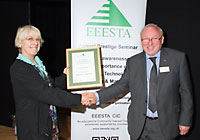
Julian Hubbard – Friend of EEESTA
Julian Hubbard was a member of the EEESTA committee for many years and gave great help with various technological problems, and forged a strong liaison between the Auditorium technical staff and the committee.
In the early days of the Prestige Events Dennis Filer was Chairman of the Committee responsible for the development of the de Havilland campus. His support was significant in enabling us to obtain entry to the Weston Auditorium and to be first occupant. He has also been an attendee at these events over many years and enthusiastic supporter. As he was unable to receive EEESTA’s thanks in person this evening his certificate will be presented privately.
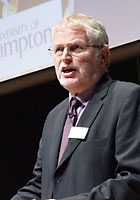
Paul Tyler
Dr Philomène Verlaan briefly explained that Professor David S. Cronan had contracted pneumonia, and that the third speaker Dr. Samantha Smith was pregnant, and was expecting her baby any day. However Dr Smith was very keen to be involved in the seminar and had pre-recorded her presentation. She then set the scene for the Seminar, and introduced each speaker.
The first speaker, Dr. Paul Tyler, gave a paper entitled “Hand in Hand: Technological Development and Exploration of the Deep Sea.” He pointed out that the remoteness of the deep ocean has challenged researchers since the mid-19th century. Sampling the deep seabed requires innovative engineering which has evolved over the last 30 years. The development of sampling techniques was discussed, and how technology drives sampling programmes in abyssal plains, submarine canyons and chemosynthetic environments. His presentation included many pictures of sampling equipment and a couple of short videos.
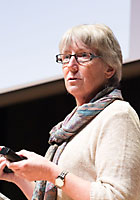
Cindy Lee Van Dover
The second speaker: Dr. Cindy Lee Van Dover talked about “Deep-Ocean Exploration, Industrialization, and Conservation”.
She described exploration on the US continental margin with US deep submergence vessels, Alvin, Jason, Sentry and Nereus, and discussed the use of remote controlled submersibles. The need to develop effective environmental management and conservation was considered. She described the great camaraderie enjoyed by the diving and support staff on the research projects.
As Dr. Samantha Smith, the third speaker, could not attend the Seminar she had pre-recorded her presentation, “Deep-Sea Mineral Production: Environmental and Social Responsibility”. Dr Smith pointed out that the world’s demand for minerals continues to rise inexorably, and that minerals from the deep sea can offer many environmental and social advantages. She described with great pride a world-leading approach to environmental management and conservation strategies for the deep sea minerals industry in which she is involved, citing case studies.
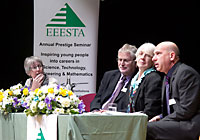
Q&A with speakers and Andreas I. Chrysostomou (right)
The seminar ended with a question and answer session which provided further interesting insights from all the speakers.
The Chairman took the unusual step of asking Andreas I. Chrysostomou, President of the IMarEST, to join the other speakers on the stage to contribute to the question and answer session: she explained that everyone called him Andreas because his surname was unpronounceable.
The Chairman then summed up, mentioning the topic for the 2014 Seminar, “Engineering for the Disabled”.
The Vote of Thanks was given Andreas I. Chrysostomou, President of the IMarEST.
This was the second year that EEESTA streamed the seminar live to the Internet, thanks to the technology and generosity of Missing Link Live and Global Teleports, and SES, who provided the space segment.
Photographs on this page by Will Dennehy Photography. Text by Ian Williamson.
